Skyrim: Alchemy - Introduction
This page of The Elder Scrolls V: Skyrim guide includes the basic information about alchemy. You will learn when to use alchemy, how to conduct alchemical experiments, how to collect alchemical ingredients, and what items are best produced through alchemy.
Main principals
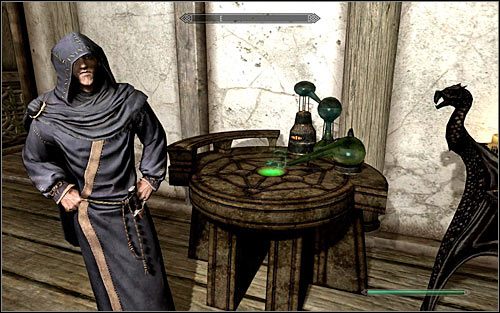
Alchemy is a subject that should prove to be interesting to all character archetypes, because it allows to create objects which are very useful during the course of the game. The main principal of alchemy is mixing the correct alchemy ingredients in order to obtain powerful potions and poisons. The entire process is much more complicated than smithing for example, because you must predict the final result on your own and you can't rely that much on recipes or plans. Alchemy labs are used to perform all experiments and it's important to know that you don't have to own any of them (it is of course possible - you can have an alchemy lab in your home, in the Dark Brotherhood hideout and in the archmage's chamber in the College of Winterhold). Nothing is stopping you from visiting one of the alchemists living in Skyrim. They won't mind sharing their place of work with you and they won't even demand any money for granting you complete access. If you don't want to waste too much time searching for alchemy labs then you should consider visiting Sleeping Giant Inn in Riverwood or Dragonsreach in Whiterun (as seen on the screen above).
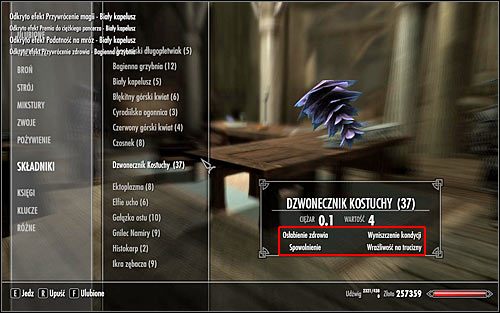
The key to a successful alchemy experiment is knowing the effects of alchemy ingredients you want to use, so that you'll mix them correctly and receive a potion or a poison. The easiest way to learn the effects of alchemy ingredients is to consume them and you can do that by opening the inventory screen, choosing the ingredients tab and clicking on one of the items. I DON'T RECOMMEND doing that for two reasons. The first season is that you can learn the effects only if you've spent at least one point on the Experimenter perk. Furthermore, in order to assure that you'll learn all four effects you must upgrade that perk to the highest third rank. The second reason is that you lose the alchemy ingredient forever the second you decide to eat it. It's not an important issue when it comes to common and cheap alchemy ingredients, however it may be a big problem with rare ingredients, because you should really conserve them and use them only during experiments. Thankfully you have this game guide and if you'll continue reading this chapter you'll find two very important tables. The table titled List of alchemy ingredients shows all available objects that may be used for alchemy purposes and it also lists their effects in the second column. The table titled List of alchemy effects shows all possible effects that can be achieved while experimenting with alchemy and it also tells about ingredients that may be used to get the desired result.
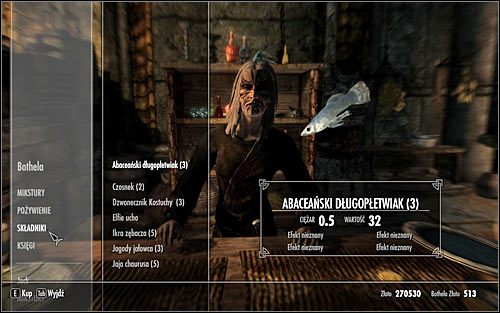
There are many different ways of obtaining alchemy ingredients and you should check the Comments column in the List of alchemy ingredients table to find out where you should be looking for them. Most alchemy ingredients can be collected while exploring Skyrim and depending on an item they can be found above ground, in human settlements or in dungeons and caves. Obtaining some of the ingredients is possible only if you've killed a certain type of an enemy or a monster and decided to check the remains afterwards. The easiest way of adding new ingredients to the list is by visiting merchants which specialize in selling them, however it's not the best option, because the ingredients will most likely cost you more gold than the actual value of a potion or a poison you'll create with their help. Naturally you shouldn't ignore visiting the stores entirely, because you may purchase some very rare ingredients that way (like daedra hearts for example).
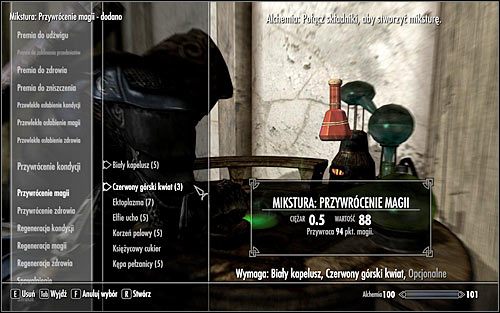
Like I've already said, alchemy is about combining alchemy ingredients. It's extremely important for you to know that in order for each experiment to succeed you must combine at least two ingredients (three if you're more experienced in alchemy) that have at least one effect in common. For example, white cap and red mountain flower have an identical effect called Restore magicka, so if you decide to combine them and confirm your choice (R key) you'll create a potion that can be used to restore mana. Important - You can't decide before proceeding with the experiment whether you want to create a potion or a poison, because this is all determined by the type of alchemy ingredients you're using! Combining ingredients with positive effects in common should result in receiving a potion and combining ingredients with negative effects in common should result in receiving a poison.
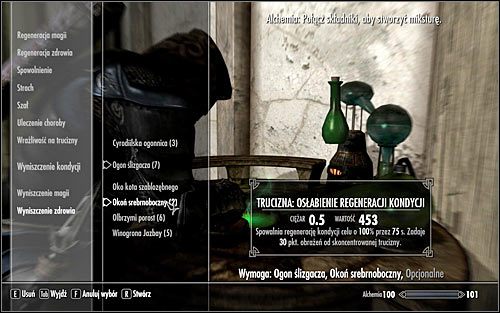
Once you've tried the basics and gained some experience you may also consider performing more difficult combinations. For example, skeever tail and silverside perch have two alchemy effects in common - Damage stamina regeneration and Ravage health. If you decide to combine these ingredients you will receive a poison which will have both of the effects and therefore will be much stronger and more useful. You can also try combining three alchemy ingredients in a single experiment, however it's very important to check all the effects to make sure that all three ingredients have at least one effect in common. Otherwise you'll spend an ingredient and won't receive anything in return. It's important to perform experiments frequently and to use other methods of improving the Alchemy skill, because this will result in being able to create better potions and poisons (the ones that deal more damage, last longer etc).
- The Elder Scrolls V: Skyrim Game Guide
- Skyrim: World Atlas
- Skyrim: Crafting
- Skyrim: Smithing - Introduction
- Skyrim: Smithing - Items - p.1
- Skyrim: Smithing - Items - p.2
- Skyrim: Smithing - Items - p.3
- Skyrim: Alchemy - Introduction
- Skyrim: Alchemy - Ingredients - p.1
- Skyrim: Alchemy - Ingredients - p.2
- Skyrim: Alchemy - Effects - p.1
- Skyrim: Alchemy - Effects - p.2
- Skyrim: Enchanting
- Skyrim: Woodcutting, Tanning, Cooking
- Skyrim: Mining and smelting
- Skyrim: Atronach Forge
- Skyrim: Crafting
- Skyrim: World Atlas
You are not permitted to copy any image, text or info from this page. This site is not associated with and/or endorsed by the developers and the publishers. All logos and images are copyrighted by their respective owners.
Copyright © 2000 - 2026 Webedia Polska SA for gamepressure.com, unofficial game guides, walkthroughs, secrets, game tips, maps & strategies for top games.
